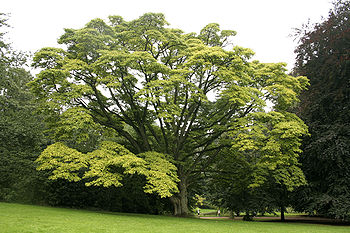Phellodendron
From Wikiwel
(Redirected from Chao Huang Bai)
Other Names : Amur Cork Bark, Amur Cork Tree, Amur Corktree, Arbre à Liège de l’Amour, Arbre au Liège de l’Amour, Arbre de Liège de Chine, Corktree, Cortex Phellodendri, Huang Bai, Huang Bo, Phellodendri Cortex, Phellodendron, Phellodendron amurense, Phellodendron de l’Amour.
Phellodendron is a plant. The bark is used to make medicine. Be careful not to confuse phellodendron with the houseplant called philodendron. The names are similar but the plants are unrelated.
See also : Huang Bai
Special Precautions of Phellodendron
- Phellodendron appears to be safe in adults when used short-term. The safety of phellodendron use for more than 6 weeks is unknown. In one study, one person experienced heartburn, shaking hands, sexual dysfunction, and thyroid dysfunction. Another person experienced fatigue and headache. But it is not known if these side effects were caused by phellodendron or some other factor.
- Pregnancy and breast -feeding: It’s UNSAFE to use phellodendron if you are pregnant. Phellodendron contains a chemical called berberine, which can cross the placenta and might harm the fetus. It’s also UNSAFE to use phellodendron if you are breast-feeding. Berberine can be transferred to the infant through breast milk and can cause brain damage in newborns, especially in premature newborns with jaundice . Jaundice is a yellowing of the eyes and skin due to bile pigments in the blood.
- Children: Phellodendron is UNSAFE in newborn infants. It can cause brain damage, especially in premature infants with jaundice.
- Cyclosporine (Neoral, Sandimmune) interacts with Phellodendron
- Medications changed by the liver (Cytochrome P450 3A4 (CYP3A4) substrates) interacts with Phellodendron.
The benefits of Phellodendron are
- Phellodendron is used for osteoarthritis, weight loss and obesity, diarrhea, ulcers in the stomach or upper part of the small intestine (peptic ulcers), diabetes , meningitis , pneumonia, eye infections, tuberculosis, and cirrhosis of the liver.
- Some people apply phellodendron to the skin for psoriasis, to kill germs, and to reduce redness and swelling.
- Some chemicals in phellodendron might reduce redness and swelling (inflammation). Another chemical, berberine, might be able to lower blood sugar and “bad” LDLcholesterol as well as protect the liver against toxic materials.
- Berberine might also be active against tumors. However, berberine can be harmful as well.
- Weight loss. Some research suggests that overweight women who take a specific product containing a combination of extracts of phellodendron plus magnolia (Relora, Next Pharmaceuticals) for 6 weeks have less weight gain than other women who did not receive the product. Women taking this product also seem to eat fewer calories than the control group. One possible explanation is that this product reduced stress and stress-related eating. But that theory doesn’t stand up, because so far there is no evidence that this product reduces the stress hormone called cortisol.
- Psoriasis. There is a report that an ointment containing phellodendron plus isatis and Baikal skullcap improved psoriasis in an 8-year-old boy with psoriasis that responded poorly to other treatments.
- Diarrhea.
- Ulcers.
- Obesity.
- Diabetes.
- Meningitis.
- Pneumonia.
- Eye infections.
- Tuberculosis.
- Cancer : Researchers at UT Health Science Center stumbled upon the possibility of phellodendron as a pancreatic cancer treatment while researching the bark’s effect on prostate tumors. Researchers discovered that prostate and pancreatic tumors share similar pathways, and cork tree extract seems to block these pathways and suppress the scarring that keeps anti-cancer drugs from working. Excessive scarring around the tumor gland (known as fibrotic tissue) prevents cancer drugs from actually reaching the cancer, rendering treatment ineffective. There are no drugs that currently suppress these pathways, which not only cause scarring but also promote the release of Cox-2 that rages systemic inflammation throughout the body. Cork tree extract, not only blocks the pathways and prevents scarring, but it also suppresses this inflammation. Research, though preliminary, is promising. Liver and kidney tumors also succumb to scarring and the subsequent resistance to drugs, and researchers are hopeful that cork tree extract may show a similar effect on a variety of these cancer tumors.
